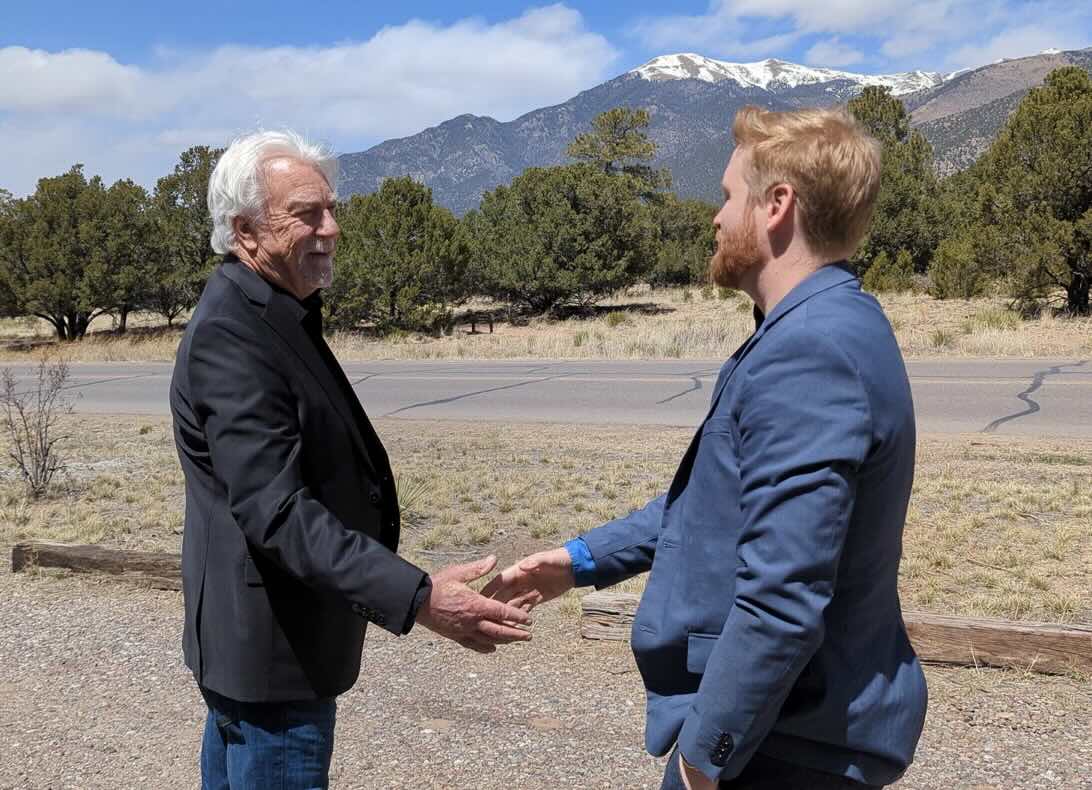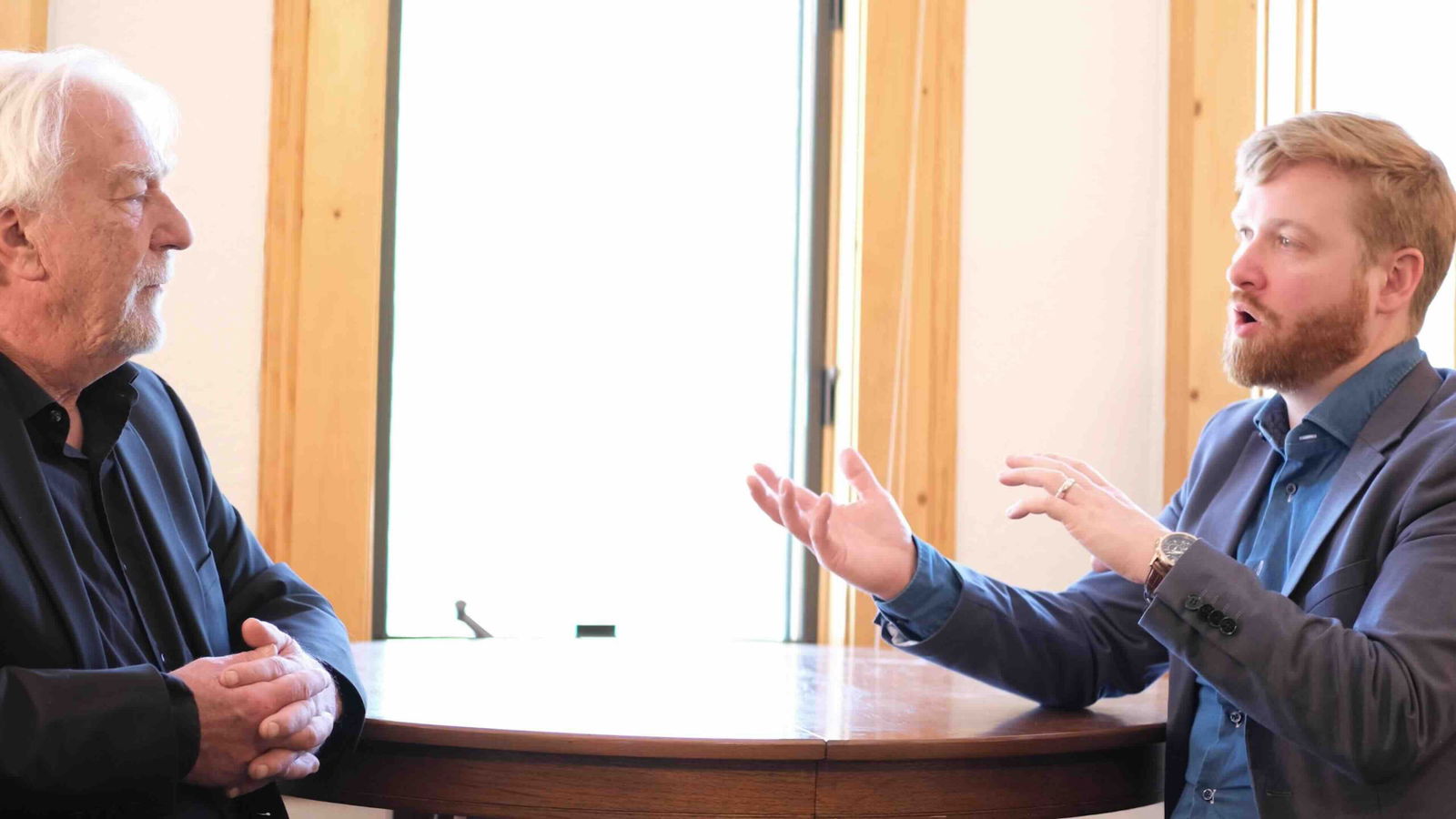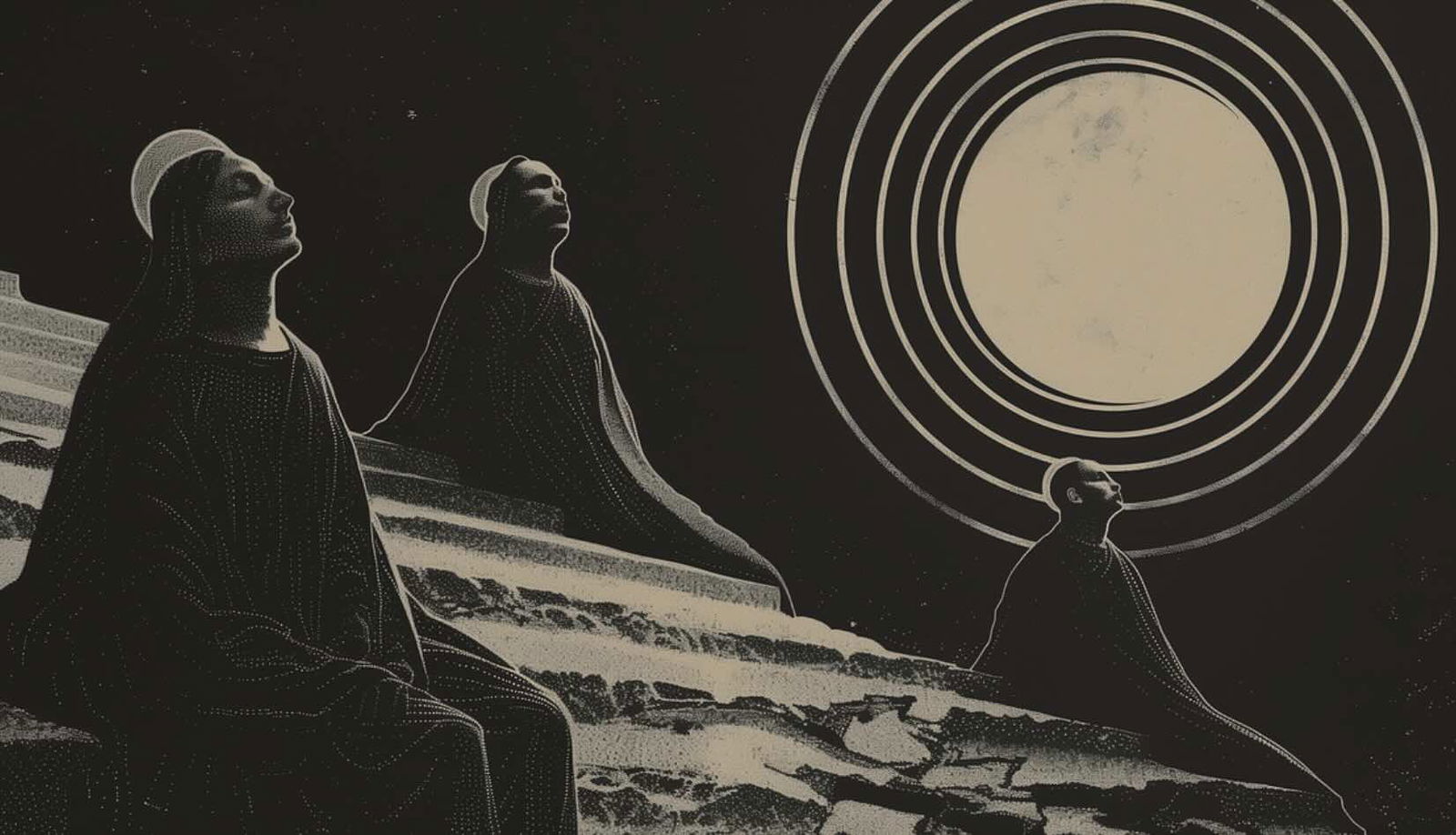In the perplexing counterculture of UFO beliefs, individuals with cult-like followings and frequent claims associated with dubious “whistleblowers” aren’t uncommon. But how can you separate genuine voices from those leveraging UFO lore for personal or financial gain?
In a new documentary, Dark Alliance: The Inside Story of the Cosmic Con, filmmaker Darcy Weir dives into one section of the UFO counterculture, narrowing in on two well-known figures: David Wilcock and Corey Goode, presenting them as case studies in manipulation and the spread of misinformation within the UFO community and its associated areas of belief.
In Dark Alliance, Weir takes his viewers on a journey of exploration into how these two controversial figures came to fool not only the community they serve, but also some of the people who brought them to the top.
However, the cautionary tale Weir presents is far from new: the events he chronicles echo the actions of cults and similar groups from over the years, many of which bear a resemblance to some of today’s alleged UFO whistleblowers, self-proclaimed insiders, and cult leaders.
UFO Cults Through the Years
According to psychologist Dr. Steve Eichel, there may be up to 10,000 cults currently operating in America, ranging from those focused on religion, to political groups, and even doomsday cults.
UFO-themed cults, while fewer in number, have nonetheless also been a prevalent fixture in American culture since the years after World War II. Among these, William A. Ferguson founded a religious cult called the Cosmic Circle of Fellowship, elements of which were detailed in his 1947 book My Trip to Mars. In it, Ferguson states that he teleported to Mars and was greeted by “celestial beings who indicated the Martians are ready to help mankind pass through a great crisis.” Ferguson also claimed he could instruct others on how to achieve interdimensional travel through deep relaxation. With time, Ferguson’s claims would become even more wild as he began manufacturing a device he called the Zerret Applicator, which he professed could cure various ailments or diseases through what he called “z-rays,” a concept created by Ferguson and later disproven by the FDA.
In 1954, fresh out of prison after a two-year sentence for selling his “Martian-inspired” medical devices, Ferguson turned his life around in a way that was truly out of this world: he released a quirky, 13-page pamphlet detailing his journey to Mars, sharing several of his curious insights and the teachings he claimed to have received from his Martian associates.
Although similar cults have cropped up throughout the years, few that involved unfounded belief in visitors from beyond Earth have managed to capture so much public attention as Heaven’s Gate, a new religious movement in the United States whose members committed mass suicide in a San Diego suburb called Rancho Santa Fe in 1997. There, a group of 39 dedicated followers of the cult, led by mastermind Marshall Applewhite, died believing that Comet Hale–Bopp was being followed by an alien spacecraft, and only through their death by ritual suicide could they could eventually join it.
More recently, an online subculture referred to as The Alien Cult has emerged on TikTok, centered around themes involving aliens and UFOs. Originating from a popular meme, the group has rapidly grown, showing up en masse in comment sections and sharing mostly humorous content, though some members have been known to spread misinformation at times, while at others debunk outlandish claims.
@purple_alien_lover
Another group, the “Starseeds,” believes they are beings from other dimensions meant to guide humanity. While these groups largely seem harmless, their structure—especially when leaders are idolized—can lead to risks of manipulation and echo chambers that discourage critical thinking and individual growth.
The “Whistleblower” Claims of David Wilcock and Cory Goode
In recent years, former Gaia television hosts and on-camera personalities David Wilcock and Corey Goode have created a veritable tidal wave of misinformation within various sections of the UFO counterculture. Among the claims made by Wilcock, in the past he has asserted that a mass ascension would happen on Earth after 2012, and suggested in his book, The Ascension Mysteries, that Earth’s role is to be a battleground in a 500,000-year conflict between positive and negative extraterrestrial forces. For Wilcock’s followers, of course, ascension could be obtained for the low price of $333.
In one YouTube livestream with over 1 million views, Wilcock told his audience that the “Illuminati Deep State” was responsible for the COVID-19 pandemic. A week later, Wilcock’s associate Corey Goode joined in with claims that a government insider told him COVID-19 was engineered as a “biological weapon from an American university” and smuggled into China by a student to act as a population control tool.
Wilcock, over time, became a best-selling author telling such fantastical tales, while Goode first appeared onscreen in 2015 during his initial interview on Gaia TV’s popular show Cosmic Disclosure, hosted by Wilcock. Goode has since claimed to possess knowledge of a “Secret Space Program” involving hidden technologies and collaborations between humans and non-humans.
Amid a Racketeer Influenced and Corrupt Organizations Act (RICO) lawsuit between Gaia and Goode, Goode has recently claimed that his extravagant assertions were based on his creative intellectual property (IP) and has expressed a desire for Hollywood to one day adopt these ideas. This claim was made in a legal deposition video leaked by Leon Isaac Kennedy, Goode’s former lawyer, who had his case dismissed after Goode failed to substantiate his allegations.
Seeking to clarify matters, Jay Weidner, former head of content at Gaia TV, decided to share his perspectives on-camera during an appearance in Weir’s documentary. Weidner recounts his first encounter with Wilcock, explaining that he was initially drawn to Wilcock’s essays on 2001: A Space Odyssey.
“He was a very charming guy, very articulate,” Weidner told Weir, adding that Wilcock “is good at taking ideas from alternative science and explaining them well” although noting that Wilcock possessed “an ego the size of the Empire State Building.”


While working at Gaia and developing Cosmic Disclosure with Goode and Wilcock, Weidner shares that Wilcock introduced Goode as a prospective co-host, advocating for the show’s focus on Goode’s claims. “This was strictly David and Corey coming up with the content. I’m not paid to vet people,” he explains. “I was just trying to make it look good and credible,” adding that the content being put forward by Goode and Wilcock was nothing he “hadn’t seen on the internet already.”
With time, Weidner says a darker reality beyond just the pair’s extraordinary claims began to become apparent.
“When you’ve been conned, you don’t want to admit it,” Weidner tells Weir. “That’s the truth of the matter. I mean, I’m admitting that I got conned. But that is really painful to admit. I was totally taken by this guy, and a lot of other people were too.”
Weir, who has spent the last four years creating this documentary, explained to The Debrief what inspired him to tell this story.
“I’ve been chasing down tales from the UFO community since 2009, and let me tell you, it’s been a wild ride,” Weir recounts. “When I first heard about blue alien bird people and David Wilcock’s ‘new star’ Corey Goode, they were lighting up the screen on Gaia TV, dishing out a story that was, well, beyond this world.”
“Back then, I was friends with Kerry Cassidy (I still am), who runs Project Camelot—a site where conspiracy theories are born and go to thrive. The idea of a secret space program with child recruits? People living a life in space fighting aliens and then coming back to live a regular life? My mind was blown.”
“Over the last decade, I kept an eye on David and Corey, and in 2021, I knew it was time to dive in and document the whole story,” Weir told The Debrief. “To get the full picture for audiences to understand, I had to start at the beginning with David Wilcock at Gaia, where he worked under Jay Weidner, then head of production. David’s rise, Gaia’s role in making him a household name in, you know, certain UFO and New Age spiritual households, and the introduction of Corey Goode.”
“That narrative seemed like a natural flow of how things progressed. Essential to understanding the wild twists of this story,” Weir says.
In a recent podcast interview with The Debrief, Weidner claims Goode and Wilcock both exhibited “cult leader” behavior. “I learned a lot about cults through this. If you watch the last 20 minutes of Cosmic Secret, their last movie, they’re [Goode and Wilcock] laying out how to make their cult,” Weidner says.
Weidner further describes working on Cosmic Disclosure, saying that team members were “naive and hopeful,” likening it to “almost like a cult.”
“After the three-hour talk, we were chosen by the Secret Space Program to present all of this information to the world. We were chosen. We were the ones,” Weidner recounts of how Goode convinced him and the team that they were the “chosen” insiders.


Weidner also shared with The Debrief that Goode at times displayed violent tendencies behind the scenes. “Corey was consistently talking about violence, constantly talking about how to hurt people. Gave me a whole exposition on how to kill someone with our iPhone.”
“No one would listen to me,” Weidner said when asked if these behaviors were ever reported. “I did go to Gaia and said that Corey Goode is radioactive, and I got laughed at.”
Real Whistleblowers vs Questionable Claims
Weir’s documentary presents a cautionary tale detailing how Wilcock and Goode promoted baseless claims that, for most viewers, would seem nonsensical, and yet gained significant traction among their audiences. Despite such concerns, Weir nonetheless cautions against lumping all alleged whistleblowers into the same category.
“Whistleblowers are real, and they’re out there,” Weir told The Debrief. “We’ve got real-deal cases like those of Chelsea Manning, Edward Snowden, Lue Elizondo, and David Grusch, who had access to high-security clearance info during their time with high-level U.S. defense or intelligence agencies.”
However, not everyone who makes sensational claims should be taken seriously simply because they claim to be a whistleblower, Weir concedes.
“Some of these, let’s call them creative storytellers, have ended up with quite a megaphone. And in the right hands, like the extensive subscriber base reach of Gaia’s UFO-friendly streaming network, even the most out-there claims have caught fire,” says Weir.
“Now, I do believe the Defense and Intelligence communities have some big secrets on UFOs stashed away. Whether it’s non-human interaction or something equally mind-bending, the truth seems to not be fully disclosed to mainstream media. But sometimes, when a story gets hot, certain folks decide they just have to be part of the action, blue alien bird people and all,” Weir says.
Weir told The Debrief that one of the challenges revealed to him while creating the new documentary had been that even when information seems obviously outlandish, it can still be difficult to distinguish simple lies and bad information from genuine cult activities.
“Recognizing cult-like behavior is tough, especially for those caught up in it,” Weir told The Debrief.“Cult leaders often keep followers hooked using a blend of fear and love. They introduce fears of doomsday scenarios like catastrophic solar events, then ease these anxieties by offering salvation—of course, with a catch: true transcendence requires financial commitment through classes, workshops, or other paid programs.”
Cults and certain whistleblower communities often share similar characteristics that foster dependency and obedience among followers, frequently using manipulative tactics to control beliefs and behavior. Leaders within these groups often project themselves as charismatic figures with “exclusive” knowledge, claiming insights only they possess. They discourage trust in mainstream information and promote isolation, suggesting that science, media, and government cannot be trusted. Members are discouraged from questioning group beliefs under threat of punishment or exclusion, while the leader’s authority is portrayed as absolute, often invoking apocalyptic or fear-based messaging that intensifies loyalty by positioning the group as the only path to safety.
These leaders may also create a sense of urgency and dependency by portraying themselves as “chosen” or uniquely connected to higher intelligence, often introducing extreme or even violent rhetoric to maintain control. This environment fosters extreme beliefs, restricts followers’ access to outside information, and manipulates members into donating significant portions of their income, all under the guise of supporting the group’s mission. In many cases, these strategies culminate in a closed ecosystem where followers are expected to support the leader’s vision without question, creating an echo chamber that hinders critical thinking and facilitates emotional or even physical abuse.
“Historically, this pattern seems all too common,” Weir told The Debrief.
In contrast to the assurances of “truth,” secret insider knowledge, and freedom that such individuals often promise their followers, for Weir advocates for asking questions, critically thinking, and not following those who appear to display a desire to exploit others for their own personal gain.
“You know what they say about truth,” Weir adds. “It sets you free.”
Chrissy Newton is a PR professional and founder of VOCAB Communications. She currently appears on The Discovery Channel and Max and hosts the Rebelliously Curious podcast, which can be found on The Debrief’s YouTube Channel on all audio podcast streaming platforms. Follow her on X: @ChrissyNewton and at chrissynewton.com.

